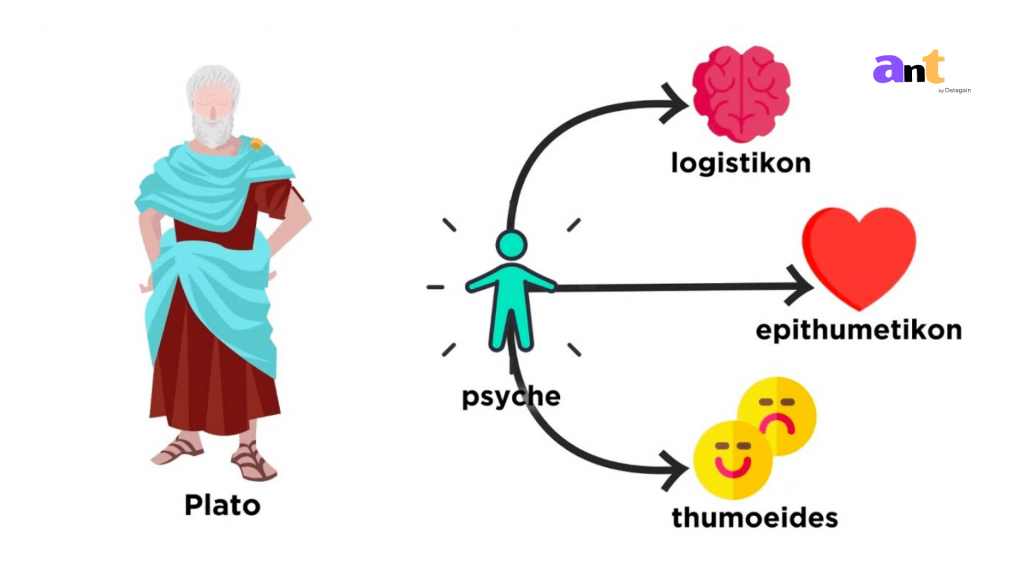
Home » Transcript Library » Psychology » A Brief History of Psychology: From Plato to Pavlov Transcript
A Brief History of Psychology: From Plato to Pavlov Transcript
Dave Farina 00:00:06
If we are going to learn psychology, we actually have to start with a little bit of history first. Now, you may be wondering why a psychology series is starting with a history lesson. Well, it turns out that what we consider to be psychology today is very different than what was considered to be psychology in the past. We will be focusing mainly on modern psychology in this series, but knowing the history of psychology will give us a better understanding of the influences that shaped psychology into the field of study that it is today. It will also give us an idea of how psychologists, both past and present, think about the mind and how it works. In knowing psychology’s history, we will be better prepared to understand and appreciate the psychological concepts to be covered later.
00:00:53
We’re going to start by going way back. People have been thinking about the mind for thousands of years. Many cultures throughout history spent a lot of time speculating on the nature of the mind and soul. The most prominent figures in ancient psychology are Ancient Greek philosophers like Plato and his student Aristotle. They created theories attempting to explain how the mind works and what causes human behavior. Plato, for example, believed that the soul, or psyche, had three parts: the intellectual part, or logistikon; the part that focused on wants and desires, or epithumetikon; and the emotional part, or thumoeides. A healthy psyche would have all three parts in balance. Aristotle built on Plato’s ideas about the mind, emphasizing observation and reason as the way to acquire knowledge and understand nature. These ideas became the foundation of what we consider early psychology today. The Greeks were so influential that we took their word for soul, psychí, and made it part of the word psychology.
00:02:04
Psychology continued to develop through the Renaissance and was heavily influenced by the work of 17th century philosopher, René Descartes. Descartes believed that the mind and the body are two separate things. This is a theory called Cartesian dualism or mind-body dualism. In dualism, the mind is an immaterial substance that is the source of your thoughts, emotions, and beliefs, while the body is a physical substance. The central claim of dualism is therefore that the immaterial mind and the material body are two distinct substances which interact to cause behavior. But how can an immaterial thing interact with a material thing? Descartes suggested that the immaterial soul resides in and influences the body from the pineal gland, a part of the brain we learned about in our study of the endocrine system. Philosophers continued to debate this idea and theorize other ways the mind could work up until the middle of the 19th century.
00:03:08
Now you may have noticed that we have been using the term “philosopher” instead of “psychologist” when talking about early psychology. When thinking about the mind, philosophers struggled with how to measure immaterial things like thoughts and feelings. Since we couldn’t actually measure anything, early psychology was considered to be a branch of philosophy and not a science. It wasn’t until we started learning how the brain actually works that we could start using the scientific method to study the mind. What we think of as psychology began in 1879 when German professor Wilhelm Wundt founded the first experimental psychology lab at the University of Leipzig, officially separating psychology from philosophy. In fact, Wundt was the first person ever to call himself a psychologist. He and those in his lab began using the scientific method to study the mind, thereby setting the stage for future psychologists.
00:04:08
After Wundt, psychology grew into multiple schools of thought and fields of study. The earliest school of thought is known as structuralism, which was founded by Edward Titchener, a student of Wundt. Structuralists believed that all psychological processes were made of basic elements, or structures. They discovered these elements by asking research participants to describe their exact experiences as they work on mental tasks, a process known as introspection. A person reading a book, for example, might say that they are seeing some black lines on white paper. But structuralism was limited. Participants often couldn’t accurately describe how they performed mental tasks. You’re seeing black lines on paper when you read, but how do you get information from those lines? How do you describe the manner in which you complete a math problem?
00:05:03
From these questions, the structuralists realized that the mind was doing things like processing information outside of our conscious awareness. This leads us to another school of thought called functionalism. Unlike the structuralists, the functionalists believed that consciousness could not be broken down into parts. They believed it was a continuous and changing mental process. Because of this view, the functionalists asked a different question than the structuralists. Instead of trying to understand how the mind works, functionalists wanted to know why the mind does certain things. Why do we have emotions? Why do we form relationships? How do human behaviors help us live in our environment? Functionalists tried to answer these questions by directly observing the human mind and human behavior.
00:05:57
The neurologist Sigmund Freud created his own theory of psychology in the late 1800s and early 1900s. He is the founding father of psychoanalysis, which focuses on the role of unconscious thoughts, feelings, and memories in understanding behavior. Freud theorized that these unconscious thoughts and forgotten memories controlled literally everything that a person does. In Freudian psychology, the psyche is made up of three parts, much like what Plato believed in ancient Greece. To Freud, these three parts were the id, or instincts; the ego, or reality; and the superego, or morality. So, the id is the part of the psyche that is full of primitive desires, sexual and aggressive drives, as well as hidden memories, while the superego is the psyche’s moral conscience. The ego’s job is to mediate between the other two parts. All three parts working together is what ultimately creates human behavior.
00:07:03
Unfortunately for Freud, the id, ego, and superego are unobservable and cannot be tested scientifically, making this theory more philosophy than psychology. Very few modern psychologists fully subscribe to Freudian principles any longer, particularly his theory regarding psychosexual stages, but he was incredibly influential in the development of psychoanalysis as well as the field of psychology itself, and we will circle back to go deeper with Freud’s work later in the series. It was because of him that psychologists began to study the unconscious mind, and how basic motivations and desires influence behavior. Freud was also one of the first people to understand the importance of early childhood in shaping adult behavior and personality, and one of the few people of his time to willingly discuss pleasure and sexuality in a scientific context.
00:07:57
Another school of thought arose in the early 20th century which was called behaviorism. Unlike other schools of thought, which focused on the conscious and unconscious mind, behaviorism attempted to make psychology more scientific by only studying observable behavior. One of the earliest behaviorists was Ivan Pavlov, the physiologist who studied classical conditioning in dogs. This is something we talked about while discussing learning and memory in the biopsychology series. As we recall, he studied dogs who learned by repetition to associate a ringing bell with mealtime, and would eventually salivate when they simply heard a bell, in anticipation of the associated meal. Pavlov and other behaviorists thought that psychology was the study of behavior. Because you can’t see or measure consciousness or the mind, you can’t use it as part of your scientific study of psychology. The behaviorists were wrong about this, as we will discuss later. One can indeed study thoughts and feelings. Although behaviorism isn’t a school of thought any longer, it was important in establishing how learning occurs, and focusing on observable behavior is an important part of psychology today.
00:09:13
Starting in the 1960s, psychologists began to wonder how the brain might be involved in mental processes like perception, thinking, memory, and judgment. They still wanted to study observable behaviors like the behaviorists, but they wanted to know what was going on inside the mind and the brain. This type of psychology, called cognitive psychology, is an active area of research today. Cognitive psychologists study things like perception, decision-making, and problem solving, often using brain imaging tools like MRI to see what role the brain plays in these behaviors. As we can see, psychology has changed immensely from its early beginnings in philosophy with the ancient Greeks to the start of experimental psychology in Wundt’s lab, and it continues to change and grow every year.
00:10:08
Unlike psychologists of the past, today’s psychologists do not necessarily identify with a particular school of thought like functionalism, structuralism, or behaviorism. Modern psychologists instead typically have a particular field of research that they focus on, like the cognitive psychologists we mentioned before. Other fields include developmental psychology, which looks at how the mind changes over a lifetime, and social psychology, which asks how social situations and cultures affect our behavior. Each of these fields are huge and continuing to grow. In this series, we will talk about a few main ideas from each of these fields to give you an idea of what kind of research is occurring in psychology as a whole. For now, let’s move forward and talk about how psychologists actually test what the mind is doing.
00:11:03
Thanks for watching. Subscribe to my channel for more tutorials. Support me on Patreon, so I can keep making content. And as always, feel free to email me, professordaveexplains@gmail.com.
Copyright Disclaimer
Under Title 17 U.S.C. Section 107, allowance is made for “fair use” for purposes such as criticism, comment, news reporting, teaching, scholarship, and research. Fair use is permitted by copyright statute that might otherwise be infringing.






